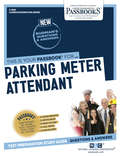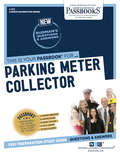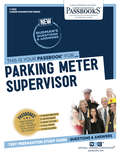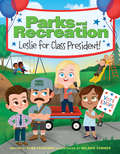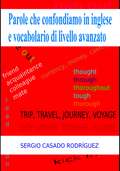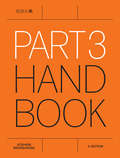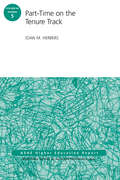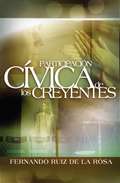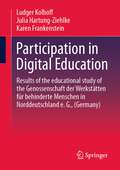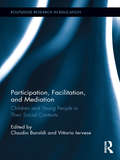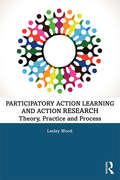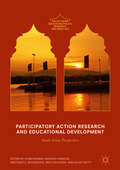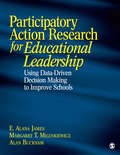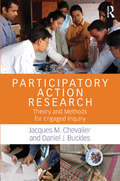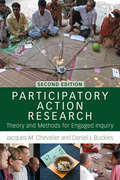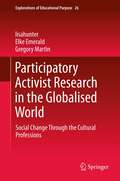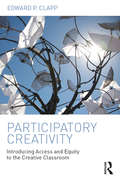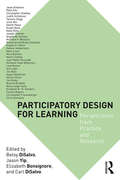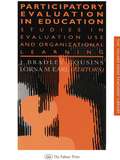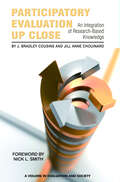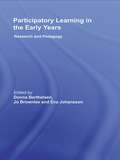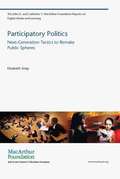- Table View
- List View
Parking Enforcement Agent: Passbooks Study Guide (Career Examination Series #C-572)
by National Learning CorporationThe Parking Enforcement Agent Passbook® prepares you for your test by allowing you to take practice exams in the subjects you need to study. It provides hundreds of questions and answers in the areas that will likely be covered on your upcoming exam, including but not limited to: understanding and interpreting written material related to enforcement; effective communication; map reading; understanding charts and tables; name and number checking; and more.
Parking Meter Attendant: Passbooks Study Guide (Career Examination Series)
by National Learning CorporationThe Parking Meter Attendant Passbook® prepares you for your test by allowing you to take practice exams in the subjects you need to study. It provides hundreds of questions and answers in the areas that will likely be covered on your upcoming exam.
Parking Meter Collector: Passbooks Study Guide (Career Examination Series)
by National Learning CorporationThe Parking Meter Collector Passbook® prepares you for your test by allowing you to take practice exams in the subjects you need to study. It provides hundreds of questions and answers in the areas that will likely be covered on your upcoming exam.
Parking Meter Supervisor: Passbooks Study Guide (Career Examination Series)
by National Learning CorporationThe Parking Meter Supervisor Passbook® prepares you for your test by allowing you to take practice exams in the subjects you need to study. It provides hundreds of questions and answers in the areas that will likely be covered on your upcoming exam.
Parks and Recreation: Leslie for Class President!
by Robb PearlmanFilled with fan-favorite characters and hilarious references to the acclaimed TV show, this storybook is an age-appropriate way for fans of Parks and Recreation to share their love with the whole family!Leslie Knope is running for class president! She campaigns all around Pawnee Elementary with her friends, Ann and Ben. In order to win over voters, though, Leslie starts to make some big promises . . . ones she's not sure she can keep. Will Leslie be able to keep her word and become the best president Pawnee Elementary has ever seen? Filled with colorful, detailed illustrations and brimming with Easter eggs and nods to iconic moments from the show, this hilarious reimagining features a pint-sized cast.The story will introduce Parks and Recreation to a whole new generation and will teach them the importance of staying true to yourself. And waffles.Parks and Recreation © Universal Television LLC. All Rights Reserved.
Parole che confondiamo in inglese e vocabolario di livello avanzato
by Sergio Casado RodríguezÈ un libro che aiuta a dissipare i dubbi che si hanno nell'imparare l'inglese per i non nativi. Il libro si divide per concetti e sppiega, con tanto di esempi, l'uso ed il coretto significato delle parole prese in analisi.
Part 3 Handbook
by Stephen BrookhouseThe decision to take the final step to becoming a fully qualified architect exam can be daunting. Fortunately, this new edition of the Part 3 Handbook demystifies the whole process of qualifying, dispelling commonly held myths and offering genuine insight into what examiners really want. Written by an experienced practitioner and Professional Studies Advisor, and endorsed by the RIBA, the book concentrates on the separate elements that you will be assessed on in the Part 3 exam. Fully updated for 2020, this edition features a brand new chapter on professional development and includes up-to-date guidance on the 2020 plan of work.
Part-Time on the Tenure Track: AEHE Volume 40, Number 5 (J-B ASHE Higher Education Report Series (AEHE))
by Joan M. HerbersThe case for a flexible work schedule for faculty has been repeatedly made, with one policy recommendation being part-time positions for tenure-track/tenured faculty (PTTT). Despite some of the benefits of this approach for both faculty and institutions, the PTTT concept is the least implemented policy for faculty flexibility and is poorly understood. This report offers the first comprehensive treatment of PTTT, suggesting that this mode of flexibility enhances recruitment, retention, and engagement of faculty, while offering value-added productivity, planning potential, and faculty loyalty for the institution. Herbers provides data that explore how a PTTT policy can lead to faculty success and satisfaction across the lifespan of a career, and likewise offers analogies and examples of well-established practices that administrators across institution types can adapt to create their own policies. Administrators and faculty will find the author’s policy recommendations, best practices, and solutions to common challenges to be a roadmap for stimulating change in their institutions. This is the 5th issue of the 40th volume of the Jossey-Bass series ASHE Higher Education Report. Each monograph is the definitive analysis of a tough higher education issue, based on thorough research of pertinent literature and institutional experiences. Topics are identified by a national survey. Noted practitioners and scholars are then commissioned to write the reports, with experts providing critical reviews of each manuscript before publication.
Participación cívica de los creyentes
by Fernando Ruiz de la RosaEjemplos de encomiendas preponderantemente políticas tales como las desarrolladas por José el soñador al lado de Faraón, de Nehemías al lado del rey Artajerjes, de Daniel al lado de Nabucodonosor, de Darío y de Ciro de Persa, de Ester y Mardoqueo al lado del rey Asuero, de Isaías al lado del rey Uzías así como otros másm tanto del Nuevo como del Antiguo Testamento, permitirán conceder al lector, sustento escritural, pero emitir un juicio de mayor conciencia en este especto.El objectivo del libro es concientizar a los lectores de la gran responsabilidad cívica y social que cada cristiano tiene.
Participant Handbook - Data Entry Operator (Divyangjan)
by Skill Council for Persons with DisabilityThe Participant Handbook - Data Entry Operator (Divyangjan) is a comprehensive guide designed to provide skill-based training for individuals with disabilities, focusing on the role of Domestic Data Entry Operators within the IT-ITeS sector. It aligns with the National Occupational Standards and offers structured learning through a modular approach. Covering essential aspects like data entry processes, software requirements, troubleshooting, and employability skills, the handbook emphasizes accuracy, professionalism, and error mitigation in data handling. It also incorporates guidelines for leveraging automation technologies such as OCR and AI to enhance efficiency, while addressing the unique needs of participants through tailored content for various disabilities.
Participation in Digital Education: Results of the educational study of the Genossenschaft der Werkstätten für behinderte Menschen in Norddeutschland e. G., (Germany)
by Ludger Kolhoff Julia Hartung-Ziehlke Karen FrankensteinDigital education offers support the equal participation of people with disabilities in lifelong learning. They thus provide access for independent living and participation in all areas of life and are highlighted as a central factor of successful inclusion. In order to give people with impairment the opportunity to participate in digital education, the educational and qualification needs of people with impairment in 10 member institutions of the Cooperative of Workshops for Disabled People in Northern Germany e.G. were recorded in 2016 - 2018. In this volume, existing analyses on the educational needs of people with impairments and existing educational offers are evaluated and more than 500 people with impairments are interviewed. On the basis of this study, needs-oriented digital educational offers are created in a targeted manner.
Participation, Facilitation, and Mediation: Children and Young People in Their Social Contexts (Routledge Research in Education)
by Claudio Baraldi Vittorio IerveseTraditionally, children have been considered from a primarily developmental perspective, in need of education in order to achieve autonomy, growth, and eventually adulthood. Childhood studies have recently underlined an alternate way to look at children, starting from the consideration that children are competent social actors and can actively participate in social life. However, there has been relatively little attention paid to the ways in which adults can actively empower children’s agency and participation. This book aims to highlight this important aspect, explaining the position of adults as facilitators and mediators in the process of constructing childhood.
Participatory Action Learning and Action Research: Theory, Practice and Process
by Lesley WoodParticipatory Action Learning and Action Research offers a concise yet comprehensive explanation of the theory, practice and process of this emerging paradigm, methodology and theory of learning. PALAR is a transformative, collaborative and democratic process for resolving complex problems within the context of sustainable professional, organisational and community development. The book draws on real-life examples from socially and economically challenged contexts, and features critical reflections on the strengths and challenges of this evolving methodology in relation to the increased interest in community engagement and project-based learning among institutions of higher education. Analysing theory in the context of sustainable professional, organisational and community development, this book: Provides a comprehensive, research-based manual on the use of PALAR within actual research projects. Explains a means of engaging in research that promotes the mobilisation of human potential relevant in a rapidy changing society. Addresses the challenges of doing participatory research within institutions. Provides applied, specific examples of how PALAR can be adapted for use in socially and economically challenged contexts, typical of developing economies. Offers critical reflections by researchers and community participants on the challenges and uses of PALAR. Innovative, and offering clarity on ethics and research questions, Participatory Action Learning and Action Research will be of interest to both emerging and experienced researchers looking to bring about change at a personal, professional, organisational or community level.
Participatory Action Research
by William Foote WhyteThis text provides perspectives on the practice and evolution of participatory action research.
Participatory Action Research and Educational Development
by Huma Kidwai Radhika Iyengar Matthew A. Witenstein Erik Jon Byker Rohit SettyThis volume brings together diverse thinkers and practitioners on Participatory Action Research (PAR) and educational development in South Asia. Contributors draw from their research and field experiences on how PAR is currently being understood, theorized, debated, and implemented for education of children in South Asia. This book will act as a key reference text for academics, students, and practitioners interested in the intersection of education and participatory development in the region. The book opens a constructive debate on PAR approaches to education and proposes a reflective framework that allows the reader to develop their perspectives about the conceptual, methodological, and sociopolitical potential and limitations of participatory approaches.
Participatory Action Research for Educational Leadership: Using Data-Driven Decision Making to Improve Schools
by E. Alana James Alan J. Bucknam Margaret T. MilenkiewiczFollow the author on Twitter! Alana James has a new twitter feed titled AR4Everything, which covers action research and reports on interesting facts."Finally we have a data-driven text on participatory action research for educational leaders. Through thoughtful examples and guided instruction, this text makes the case that the complex issues of today and tomorrow require multifaceted, rigorous, and results-oriented processes best undertaken through partnerships between educators and the communities they serve." —Darlyne Bailey, Dean and Assistant to the President, University of Minnesota"This book includes a very useful hands-on approach to developing a PAR project. It is written in a manner that is accessible to teachers, it is detailed enough to provide clear descriptions, and the exercises at the end of each chapter help readers to implement the new material."—Elizabeth Grassi, Regis University"In a clear manner, this text provides the tools necessary to conduct collaborative action research in order to create needed change in our classrooms and schools. Using this book, teachers, administrators, parents, and students can become active participants in the movement toward educational change."—Emma Fuentes, University of San FranciscoThe participatory action research (PAR) process discussed in the text represents the next evolutionary stage for action research and practitioner research in education. Authors E. Alana James, Margaret T. Milenkiewicz, and Alan Bucknam provide a readable overview of the PAR process similar to professional learning communities in schools. This fresh approach to participatory action research fully integrates process with research methodology. The results of the original PAR study and continued work with educational leaders propose that this "And/Both" approach ultimately produces the effect that school leaders seek and appreciate.Key FeaturesGuides the reader through the PAR steps with a graphically illustrated process: The book's design reaches out to visual learners with graphic elements while employing a research logic model that helps ensure rigorous research methodology.Provides reflective questions preceding each section: The questions increase the reflective practices and routines of the reader as appropriate to the PAR process.Presents real-world examples: Practitioner stories make the lessons real and alleviate the emotional unease that comes from tackling research practices for the first time.Offers tasks for working both in teams and as individuals: These tools aid participatory teams in working toward consensus and strong research designs.Intended AudienceThis is an ideal core text for graduate courses such as Action Research for School Improvement, Research for Educational Practitioners, Practitioner Research, and Teacher as Researcher in departments of education. It can also be used as a supplemental text in other research methods courses and in data-driven decision-making courses.Meet author Alan Bucknam! http://www.notchcode.com/
Participatory Action Research: Theory and Methods for Engaged Inquiry
by Jacques M. Chevalier Daniel J. BucklesThis book addresses a key issue in higher learning, university education and scientific research: the widespread difficulty researchers, experts and students from all disciplines face when trying to contribute to change in complex social settings characterized by uncertainty and the unknown. More than ever, researchers need flexible means and grounded theory to combine people-based and evidence-based inquiry into challenging situations that keep evolving and do not lend themselves to straightforward technical explanations and solutions. In this book, the authors propose innovative strategies for engaged inquiry building on insights from many disciplines and lessons from the history of Participatory Action Research (PAR), including French psychosociology. The ongoing evolution of PAR has had a lasting legacy in fields ranging from community development to education, public engagement, natural resource management and problem solving in the workplace. All formulations have in common the idea that research must be done ‘with’ people and not ‘on’ or ‘for’ people. Inquiry of this kind makes sense of the world through efforts to transform it, as opposed to simply observing and studying human behaviour and people’s views about reality, in the hope that meaningful change will happen somewhere down the road. The book contributes many new tools and conceptual foundations to this longstanding tradition, grounded in real-life examples of collective fact-finding, analysis and decision-making from around the world. It provides a modular textbook on participatory action research and related methods, theory and practice, suitable for a wide range of undergraduate and postgraduate courses, as well as working professionals.
Participatory Action Research: Theory and Methods for Engaged Inquiry
by Jacques M. Chevalier Daniel J. BucklesFully revised and updated, this second edition of Participatory Action Research (PAR) provides new theoretical insights and many robust tools that will guide researchers, professionals and students from all disciplines through the process of conducting action research ‘with’ people rather than ‘for’ them or ‘about’ them. PAR is collective reasoning and evidence-based learning focussed on social action. It has immediate relevance in fields ranging from community development to education, health, public engagement, environmental issues and problem solving in the workplace. This new edition has been extensively revised to create a user-friendly textbook on PAR theory and practice, including: updated references and a comprehensive overview of different approaches to PAR (pragmatic, psychosocial, critical); more emphasis on the art of process design, especially in complex social settings characterized by uncertainty and the unknown; developments in the use of Web2 collaborative tools and digital strategies to support real-time data gathering and processing; updated examples and stories from around the world, in a wide range of fields; critical commentaries on major issues in the social sciences, including stakeholder theory, systems thinking, causal analysis, monitoring and evaluation, research ethics, risk assessment and social innovation. This modular textbook provides novel perspectives and ideas in a longstanding tradition that strives to reconnect science and the inquiry process with life in society. It provides coherent and critical treatment of core issues in the ongoing evolution of PAR, making it suitable for a wide range of undergraduate and postgraduate courses. It is intended for use by researchers, students and working professionals seeking to improve or rethink their approach to co-creating knowledge and supporting action for the well-being of all.
Participatory Activist Research in the Globalised World
by Gregory Martin Elke Emerald LisahunterAction research was conceived as a method of collaborative, self-reflective problem-solving in a community context. Yet many believe it has evolved too far away from its original, directly activist roots. As a direct response to calls for a rejuvenation of the social agenda of 'action research', this volume provides an all-inclusive road map to generating and implementing politically active grass-roots research activities. It is a priceless practical guide for the newly minted researcher wanting to make a tangible difference in their profession and in the world. Where some action research models have been criticized for losing focus on the participatory and social justice roots of this type of research, this book puts social justice activism squarely center stage, guiding the researcher through the theoretical, methodological and practical considerations and constraints of developing, implementing and sustaining research in the cultural professions. Lcating and contextualizing the history and theory of action research, critical theory and other related methodologies and concepts, this volume takes the reader on a journey that begins with the formation of a question, puzzle or research idea right through to the publication of a report on your finished project. Including discrete sections on every stage in the process, from generating a social justice activism agenda, through forming a team and empowering participants, to ensuring the implementation of your agenda and publishing and disseminating your work. Engaging their readers with a fresh acronym, PAtR--Participatory Activist Research--the authors give fresh impetus to those looking for a systematic way to understand and shape practice in their daily work, their profession and their world. This is an outstanding book that represents a critical research process sorely needed in the academy today. Any researcher interested in making an intervention into the egregious social conditions wrought by neoliberal capitalism would do well to read this book. An important contribution to the literature on research methodology. Peter McLaren, Professor, School of Critical Studies in Education, University of Auckland This is an outstanding book that represents a critical research process sorely needed in the academy today. Any researcher interested in making an intervention into the egregious social conditions wrought by neoliberal capitalism would do well to read this book. An important contribution to the literature on research methodology. Peter McLaren, Professor, School of Critical Studies in Education, University of Auckland
Participatory Creativity: Introducing Access and Equity to the Creative Classroom
by Edward P. ClappParticipatory Creativity: Introducing Access and Equity to the Creative Classroom presents a systems-based approach to examining creativity in education that aims to make participating in invention and innovation accessible to all students. Moving beyond the gifted-versus-ungifted debate present in many of today’s classrooms, the book’s inclusive framework situates creativity as a participatory and socially distributed process. The core principle of the book is that individuals are not creative, ideas are creative, and that there are multiple ways for a variety of individuals to participate in the development of creative ideas. This dynamic reframing of invention and innovation provides strategies for teachers, curriculum designers, policymakers, researchers, and others who seek to develop a more equitable approach towards establishing creative learning experiences in various educational settings.
Participatory Design for Learning: Perspectives from Practice and Research
by Carl Disalvo Betsy Disalvo Elizabeth Bonsignore Jason YipParticipatory Design is a field of research and design that actively engages stakeholders in the processes of design in order to better conceptualize and create tools, environments, and systems that serve those stakeholders. In Participatory Design for Learning: Perspectives from Practice and Research, contributors from across the fields of the learning sciences and design articulate an inclusive practice and begin the process of shaping guidelines for such collaborative involvement. Drawing from a wide range of examples and perspectives, this book explores how participatory design can contribute to the development, implementation, and sustainability of learning innovations. Written for scholars and students, Participatory Design for Learning: Perspectives from Practice and Research develops and draws attention to practices that are relevant to the facilitation of effective educational environments and learning technologies.
Participatory Evaluation In Education: Studies Of Evaluation Use And Organizational Learning (Teachers' Library #Vol. 8)
by Lorna M. EarlThis text focuses on "participatory evaluation", an approach that involves teachers and educational administrators as partners with researchers in a broad range of school and school system-based evaluation tasks with the explicit goal of using such data to improve practice.; Participatory evaluation is a natural, suitable and effective approach to school improvement and educational change, and has been practiced by the editors and several colleagues for many years. Though participatory applied research strategies are growing in popularity, there is a paucity of documented empirical support for the approach. presenting a set of original empirical studies and a critical analysis of them this book will add to our knowledge about variations in the approach, conditions that support it, its viability within the culture of schools and school systems and its likely impact defined in terms of the use of research data and organisational learning.; The book will be useful for educational practitioners interested in critically evaluating the potential of participatory evaluation as an integral part of their own approach to educational reform. It will also clarify an agenda for research to further our understanding of the organisational benefits of this type of collaborative systematic enquiry.
Participatory Evaluation Up Close: An Integration of Research-Based Knowledge (Evaluation and Society)
by J. Cousins Jill ChouinardEmpiricism provides the backbone of knowledge creation within social science disciplines (e.g., psychology, sociology) and applied domains of study (e.g., education, administration) alike. Yet, relative to such domains of inquiry, comparatively little empirical research on evaluation has occurred, and the research knowledge base been infrequently synthesized and integrated to influence theory and practice. The proposed book aims to fill this void with regard to participatory evaluation, a set of collaborative approaches to evaluation that is receiving considerable attention of late, including a growing body of empirical studies.
Participatory Learning in the Early Years: Research and Pedagogy (Routledge Research in Education)
by Eva Johansson Jo Brownlee Donna BerthelsenThe early years are an important period for learning, but the questions surrounding participatory learning amongst toddlers remain under-examined. This book presents the latest theoretical and research perspectives about how ECEC (Early Childhood Education and Care) contexts promote democracy and citizenship through participatory learning approaches. The contributors provide insight into national policies, provisions, and practices and advance our understandings of theory and research on toddlers’ experiences for democratic participation across a number of countries, including the UK, Australia, New Zealand, the United States, Canada, Sweden, and Norway.
Participatory Politics
by Elisabeth SoepAlthough they may disavow politics as such, civic-minded young people use every means and media at their disposal to carry out the basic tasks of citizenship. Through a mix of face-to-face and digital methods, they deliberate on important issues and debate with peers and powerbrokers, redefining some key dynamics that govern civic life in the process. In Participatory Politics, Elisabeth Soep examines the specific tactics used by young people as they experiment with civic engagement. Drawing on her scholarly research and on her work as a media producer and educator, Soep identifies five tactics that are part of effective, equitable participatory politics among young people: Pivot Your Public (mobilizing civic capacity within popular culture engagements); Create Content Worlds (using inventive and interactive storytelling that sparks sharing); Forage for Information in public data archives; Code Up (using computational thinking to design tools, platforms, and spaces for public good); and Hide and Seek (protecting privacy and information sources). After describing these tactics as they manifest themselves in a range of youth-driven activities -- from the runaway spread of the video Kony 2012 to community hackathons -- Soep discusses concrete ideas for cultivating the new literacies that will enable young people to participate in public life. She goes on to consider some risks associated with these participatory tactics, including simplification and sensationalism, and ways to avoid them, and concludes with implications for future research and practice.

